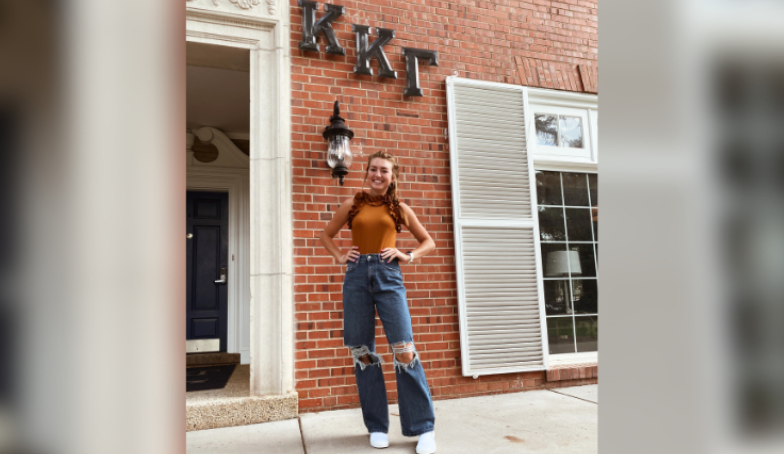In the fall of 2021, when Hannah Holtmeier decided to partake in the University of Wyoming’s sorority rush, she said she felt like Kappa Kappa Gamma (KKG) was “literally calling” her name. From the girls she initially met, to their sorority house and the overall culture that the sisters fostered, Holtmeier said she felt right at home.
The whole point of joining KKG, Holtmeier told Independent Women’s Forum (IWF), was to meet like-minded girls who had similar goals and could be her lifelong friends. But according to Holtmeier, after her first year, “that was not the case anymore.”
“‘Artemis, this is Hannah,’” Holtmeier recalled one of her sisters saying during a formal recruitment session her sophomore year. Artemis Langford, a young male identifying as a transgender woman, reportedly came to KKG with a list of questions prepared for his potential sorority sisters, to ask them “how he would be accepted, and how he would fit in.”
Holtmeier said no one felt a connection with Langford, and that this “very odd interaction” seemed as though it would be the last. It wasn’t. During informal recruitment—the period where sororities work to fill slots that didn’t get filled during the first round—Holtmeier said that, unbeknownst to her and many other KKG sisters, Langford “basically was slid under the door and somehow given a bid,” in what she called a “very backdoor process.”
Holtmeier and the other ladies in KKG were then forced to accept Langford as one of their “sisters.” This opened up a Pandora’s box of uncomfortable moments.
“Sororities are an intimate space,” Holtmeier said, describing how 30 to 40 girls live in the KKG house at a time. In addition to being where many sisters eat, sleep, shower, get dressed, and study, her sorority house also served as a home base for all members of KKG to unwind from the chaos of college life and “be a girl.”
“When there’s a six-foot-two man sitting in the corner, just watching,” she said, “it’s just hard to do that.”
Holtmeier said that Langford would often sit in their house but not engage in conversation with any of the sisters. Instead, he would just observe the girls and not make any effort to integrate into their sisterhood.
When she rushed KKG, Holtmeier thought she was signing up for an all-girls environment where she could be vulnerable and herself. “It’s not possible to do that when there’s a man sitting there listening,” she said. “You can’t have those girl conversations with a man sitting at the table next to you, just observing.”
In October 2022, Langford took to their school newspaper, the Branding Iron, to announce that he had become a transgender-identifying member of KKG. In response, Holtmeier decided that “if he can do it,” she could publicize her thoughts on his membership.
She first spoke to National Review anonymously, telling reporter and IWF Fellow Caroline Downey that KKG’s president and membership chair dismissed her discomfort with the situation, while elder sorority members “pressured” her and her fellow sisters to accept Langford as one of their own.
She described Langford as having not “fully transitioned,” meaning that from her observations, Langford still had facial hair and “made no efforts to physically look like a girl.”
Speaking to National Review, Holtmeier said, helped her and a small cohort of like-minded sisters connect with a group of KKG alumnae who were similarly opposed to a male joining a female sorority.
With the support of allied alumni, Holtmeier and six other KKG sisters moved to sue sorority leadership in March 2023 for breaching their duties to the sorority itself, captured in the KKG Bylaws’ requirement for women-only membership. The suit describes that KKG leadership purposefully avoided other Bylaws to ensure Langford’s admission, like foregoing the anonymous vote requirement and the requirement that all members vote. Neither condition, according to Holtmeier, was met.
When the lawsuit first became public, Holtmeier said she felt an intense, constant “‘all eyes on you’ type of feeling.” But, despite how many negative comments she and her sisters faced online, she said that, in person, “no one really had the nerve to actually talk to us.”
Holtmeier described the entire experience as a “mental roller coaster.” However, she added, through thick and thin, her fellow plaintiffs have had each others’ backs—even when their sorority publicly doubled down on its decision to admit Langford, calling the lawsuit “frivolous.”
And when a U.S. District Court judge denied their request to remain anonymous and required their names be made public, the sisters were again there for one another.
Though Holtmeier and her fellow sisters pursuing the lawsuit were unexpectedly thrust into the spotlight, she’s now owning it, making it her mission to ensure that other girls and women aren’t forced to integrate males into women-only spaces.
“I’m not going to quit before we define what a woman is, that’s for sure,” Holtmeier said. “I’m not going to stop until that’s set in stone.”










